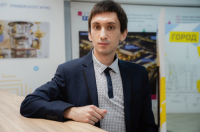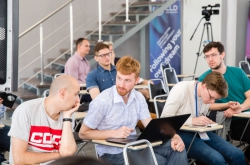The University of Crete, ITMO’s new partner university, became the conference venue. Located in Heraklion, the university is the largest higher education institution on the island and home to more than 13,000 students, 2,000 of which are enrolled in postgraduate studies. The university has an extensive network of partner institutions from Europe and worldwide. As of 2018, it ranks among the 100 top universities according to the Young University Rankings, which grades world’s most promising higher education institutions that are less than 50 years old based on their academic and scientific performance, as well as their cooperation with the industry.
Hosted by four leading universities from Russia, Greece, the Netherlands, and Singapore, this year’s YSC conference included high-profile discussions on performance computing, large scale simulation of complex systems, and big data. Modeling of complex systems, urban science and sustainable development, computational biomedicine, VR & AR in computational science and many other subjects highly topical in the computational science field were also on the agenda.
Apart from presenting their own works, the conference participants had the chance to attend workshops, lectures, and seminars given by the world’s leading scientists. Among the star guest speakers this year were Alexander Boukhanovsky from ITMO University, Angelos Bilas and Vagelis Harmandaris from the University of Crete, and other experts from Russia and Greece.

“ITMO University’s eScience Research Institute and High-Performance Computing Department have been hosting the Young Scientists Conference in Computational Science since 2012. Attended by leading scientists and young researchers from all over the world, the conference is a forum for active discussions and knowledge exchange in all areas connected to computational science and computer modeling, theory and practice alike. Past guest speakers include the likes of Jack Dongarra, Petros Koumoutsakos, Stefan Thurner, Dieter Kranzlmüller, and Heikki Mannila,” explains Anna Bilyatdinova, Vice Head of the ITMO University’s School of Translational Information Technologies.
Anna Bilyatdinova adds that to make the conference the best it can be, the organizers have had to experiment with its format, which changed from an academic presentation with a Q&A session thrown in at the end to a full-fledged summer school combined with international and interdisciplinary team project work. Participants’ papers are published in leading scientific journals indexed by Scopus and Web of Science.
“The conference has created a tight-knit community of young and open-minded professionals with a proactive approach to life and research, and we’re really proud of that. As its organizers, we’re hoping to bring it to the next level, in part by improving the quality of conference research papers through lowering their reject rate. This will increase their citation rates and contribute to enhancing ITMO’s competitive performance worldwide,” notes Ms. Bilyatdinova.

More than 90 promising scientists from all over the world took part in this year’s conference. ITMO.NEWS met them to talk about their research and YSC-2018 experience.
Varvara Ingilevich, Master’s student at ITMO University’s Faculty of Information Technologies and Programming
I specialize in spatial and temporal data analysis of crimes committed in St. Petersburg. My main goal is to create a predictive model that will contribute to the decrease of crime rates. By participating in YSC-2018, I wanted to look at what other scientists are doing, as well as to present my own work. The experience was overall very enjoyable; I met lots of great people and seized the opportunity of discovering Greece, its culture and landscapes. I’ve also brushed up on my communication and public speaking skills and learned lots of exciting things from other research areas, all of which will undoubtedly help me in my own work.
Artem Popov, PhD student at ITMO University’s Faculty of Information Technologies and Programming
I’m carrying out research aimed at enhancing effectiveness and automation of social media ads, which is linked to my work at the VK social network. Participating in the YSC-2018 conference motivated me to finally publish my research paper which was a long time in the making. It was a study in similar target audiences search algorithms, which was based on a real promotional campaign I did for ITMO University. The conference was very well-organized; I also really enjoyed the location. Apart from giving me the chance to develop my research potential, the conference has really spurred my personal development, showing me that I need to work on my English and public speaking skills, which I plan to do going forward.

Maria Kalmykova, PhD student at the Kurchatov National Research Center (Moscow)
My main line of research lies in developing image analysis computer algorithms and applying them for creating digital models to use in various scientific apps. Participating in the YCS-2018 conference allowed me not only to display and publish my work, but also to meet other scientists and learn from them. Above all, I’ve become much more confident in presenting my research in English, which I’m sure will be invaluable in my future career. Overall, I had a really great time; what I’ll remember most are the friendly working environment and the fascinating sightseeing tour.
Stepan Kochemazov, Research Associate at the the Institute for System Dynamics and Control Theory Laboratory of logical and optimization methods for complex systems analysis (Irkutsk)
I decided to participate in YSC-2018 as it is one of the few conferences for young scientists in the field of computer science that are really worthwhile. I presented my comparative study of using algorithms for maximizing the influence in simple social networks information distribution models. I greatly enjoyed the presentations of several Greek researchers; what was also amazing about them was how open they were to discussion and cooperation. As well as on the YSC-2017, the 2018 conference pleasantly surprised me with the highest-level research demonstrated by the young scientists from ITMO and other Russian universities. This motivates me to be better and more efficient in my work. There were many reports on machine learning methods and uses which got me interested. I plan on starting to use these methods in my own research, too.
Roman Wiatr, Software Engineering Expert at Codewise and PhD student at AGH University of Science and Technology (Krakow, Poland)
I'm doing research in applying data stream processing to real-time analytics. It was my academic supervisor who encouraged me to participate in YSC-2018. I gave a presentation about optimizing Kafka for low latency systems. Thanks to the conference, I met lots of inspiring people who are trying to solve similar problems with different approaches, so I’ll definitely look into their work.





